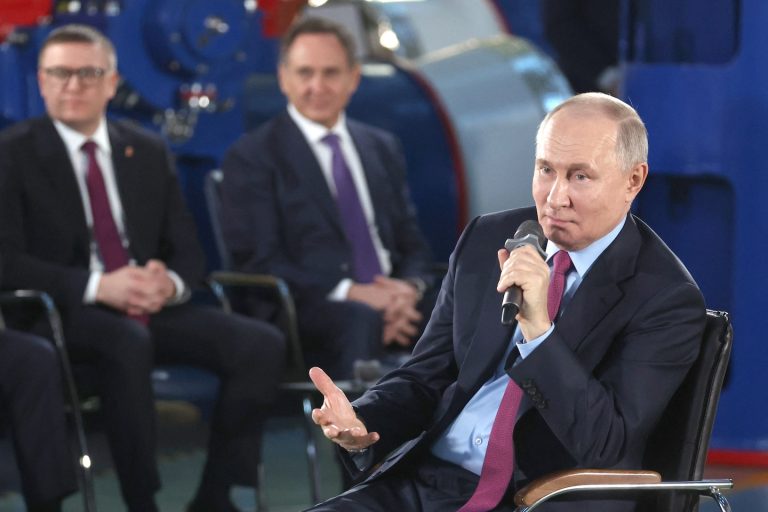“Forward! Success! To new frontiers!” Putin declared to a young female worker who expressed her admiration for the president.
With Navalny's death at the age of 47, further military aid to Ukraine still blocked in Congress, and Ukrainian forces retreating to the battlefield, much seems to be going in Putin's favor, a month before the presidential elections in Russia that he is certain to win.
Before the trip to Chelyabinsk, Putin was already enjoying a humiliating interview he had last week with former Fox News host Tucker Carlson. Even sanctions imposed by “our quasi-partners,” as Putin bragged on Friday, led to an increase in orders at the factory he was visiting.
Andrei Kolesnikov, a senior scholar at the Moscow-based Carnegie Russia Eurasia Center, said Putin was now “out of any competition.”
Navalny's death not only removes a major – if distant – political thorn. This is also another development that alerts potential Putin critics.
Last summer, the swift and apparent downing of the plane carrying Yevgeny Prigozhin, the Wagner mercenary leader who led a rebellion against Russia's military leadership, was a chilling signal to any opponent of the Kremlin's current course.
Earlier this month, Russian election authorities quickly banned the anti-war liberal candidate, Boris Nadezhdin, from participating in the presidential ballot, claiming there were irregularities in the signatures required for candidacy. Nadezhdin had no chance of winning, but the Kremlin would not tolerate even the slightest show of dissent.
“Putin now remains alone,” Kolesnikov said. “He is Solus Rex, the Sole King. No one can stop him from triumphing.”
Some still warn that Putin could overstep his bounds. They pointed to Navalny's status among some members of the Russian elite and the possibility that he would be viewed as a martyr, as well as the risk that the West would harden its resolve against Putin's regime – and perhaps even increase its aid to Ukraine.
Tatiana Stanovaya, founder of R.Politik, a Russian political consulting firm now based in France, said it seems clear that Putin will continue to crack down on the remnants of the Russian opposition, motivated by fears that the West might exploit Navalny's death to foment further unrest.
“In Putin’s eyes, the threat of Western intervention remains very serious,” she said.
But for the beleaguered Russian opposition, there is little left for Putin to do to completely paralyze the movement.
In January, Navalny had called for a nationwide protest on the day of the presidential election in March, and for voters to gather at the polls at noon as a sign of opposition against Putin.
But analysts and opposition politicians said it was not clear how many people had responded to the call given concerns about Putin's increasingly repressive tactics. However, they said Navalny's death may be a sign that the Kremlin does not want to leave anything to chance.
Kolesnikov added that the authorities in Moscow are now “very sensitive to any details.”
The muted display of mourning for Navalny in Moscow, with few people willing to dare defy the authorities by leaving flowers, was a sign of the transformation Russia has witnessed since the February 2022 invasion of Ukraine.
Thousands took to the streets of Moscow to protest Navalny's arrest upon his return to Russia in January 2021, in scenes that some observers likened to the August 2020 protests in Minsk that threatened to overthrow the Belarusian president.
But Gennady Gudkov, a prominent Russian opposition politician now living in exile in Paris, said any demonstrator in Moscow today would face a “huge crowd of armed men.”
“Street protests can only succeed if millions come out,” Gudkov said. “But because people are not organized and do not have any resources, newspapers, political leaders, parties or unions, there is nothing.”
Others said the death of such a prominent and beloved political figure in prison could create a host of problems for Putin.
“Navalny’s unparalleled recognition, importance to elites, and involvement in domestic politics set him apart from any other opposition figure,” Stanovaya posted on X, formerly known as Twitter. “This creates a big political problem for the regime – it will have to deal with Navalny’s legacy,” she said.
In Moscow, some Russian businessmen were watching with concern whether the successes achieved in winning over part of the US Republican Party to the Russian point of view could be reversed as a result of the death.
Already, GOP members on Friday began condemning party members who have recently sided with Putin, while President Biden criticized Republicans for blocking passage of a bill that included billions of dollars in aid to Ukraine.
“Putin doesn’t need this now,” said one Moscow executive, speaking on the condition of anonymity to discuss sensitive matters. “It will be very difficult now for the Republican Party to object.”
Opposition politicians called on the West to strengthen its response to Putin's regime. “The world must understand that Putin is not a human being. He is a threat to civilization,” Gudkov said. “Without the collapse of Putin’s regime, the world will not be able to live in peace.”

